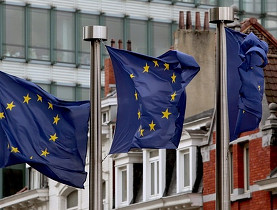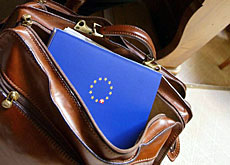Lisbon Treaty heralds trickier EU relations

Switzerland's relations with the European Union will become more complicated after the bloc's Lisbon Treaty enters force, a Swiss-EU specialist warns.
Swiss lawyer Jean Russotto, one of the leading experts in Brussels, says Swiss officials will face new EU players and working methods after the treaty comes into force on December 1.
The Lisbon Treaty streamlines the EU’s cumbersome decision-making processes and creates the posts of president of the European Council, and powerful foreign policy chief, jobs designed to give the union more clout in world affairs.
Belgian Prime Minister Herman van Rompuy was chosen as president and Britain’s EU Commissioner Catherine Ashton as foreign policy chief – the first to be appointed to the posts in a decision by leaders from the 27 EU states on Thursday.
“In one way the new treaty’s planned developments should be welcomed in Switzerland,” Russotto told swissinfo.ch. “The EU’s democratic failings, which it is plagued by, will be reduced.”
The European Parliament is likely to gain in importance as the co-decision procedure with the Council of Ministers is extended to 40 new areas of policy, including internal and legal affairs, the environment and research.
“While keeping things in perspective, the parliament will become a kind of national council, alongside the EU’s Council of Ministers, which will resemble an upper chamber, or Swiss-style Senate,” said Russotto. “Even in areas like taxation, where the European Parliament retains limited competence, there will be more substantial consultations.”
In addition, national parliaments will also have greater say in EU decisional matters, similar to the Swiss cantonal system, and a “people’s initiative”, based on the Swiss direct democracy system, will also be created.
But all this is unlikely to please Bern, said the Brussels-based lawyer.
New EU players
By making the 27-member bloc more cohesive, the Lisbon Treaty will force Switzerland to work with an awkward new player – the European Parliament.
“Switzerland is not particularly well equipped or prepared to work closely with EU MPs,” said Russotto.
Last month the speaker of the House of Representatives, Chiara Simoneschi-Cortesi called for “regular dialogue” at both EU rotating presidency and parliamentary committee levels.
The European Parliament has always backed closer European integration, unlike the member states.
“We therefore have to expect a major increase in European regulations, especially in the fields of asylum, immigration and judicial cooperation,” said the Swiss lawyer. “Switzerland won’t be able to ignore these as it is now a member of the Schengen zone and is associated with the Dublin Convention.
“Those are a lot of European issues for Switzerland to swallow all at once, perhaps too much.”
As well as the European Parliament and the European Commission, where new members will be appointed in the coming weeks, Switzerland will also have to get used to dealing with two new actors: the president of the European Council, and the EU high representative for foreign affairs.
“Switzerland won’t be able to overlook the president of the European Council, even if the appointment won’t have a major impact on the powers of the other institutions. He or she will be another essential contact person, alongside the rotating presidencies of the Council of Ministers, the EU Parliament and the European Commission.”
New working methods
And no doubt these three institutions’ working methods will be radically transformed, to the detriment of Switzerland.
The new EU high representative for foreign affairs will oversee the EU’s diplomatic service, known as the External Action Service.
They will have the tricky job of having to constantly balance the interests of member states, the EU MPs and the European Commission, where the new appointee will become vice-president.
All these changes risk rendering the EU’s decision-making “slower and more complex”, with the danger that numerous issues of interest to Bern could be “delayed for long periods”, said Russotto.
And the changes will almost certainly complicate Switzerland’s dealings with the EU, he added.
There will be closer internal cooperation between EU institutions, particularly over foreign affairs, leaving Switzerland to confront “a more unified bloc than before”, said the lawyer.
In the past Bern managed to cleverly divide in order to reign, said Russotto, but this strategy, “which allowed Switzerland to effectively preserve its interests”, will become more difficult to keep up in the future.
Tanguy Verhoosel in Brussels, swissinfo.ch (adapted from French by Simon Bradley)
Switzerland is not a member of the European Union.
The government sees EU membership as a long-term option.
In the 1990s debate over Switzerland’s policy towards Europe polarised the national political landscape.
Switzerland is linked to the EU via a series of bilateral accords and the EU is Switzerland’s main trading partner.
Switzerland has concluded more than 20 bilateral accords with Brussels, but voters in 1992 rejected the European Economic Area treaty – a halfway house to EU membership.
On November 16 Foreign Minister Micheline Calmy-Rey told a conference organised by Geneva University’s European Institute that the Swiss policy of conducting bilateral negotiations with the EU was becoming “increasingly difficult”.
She said the 27 EU members were “beginning to have had enough” of special demands from Bern.
Jean Russotto is a Swiss lawyer working for the Brussels office of Steptoe & Johnson LLP. He specialises in EU law.
Russotto started work as a lawyer for canton Vaud’s Justice Department. He also worked as a lawyer for Nestlé in Vevey, Switzerland, and has practised for US law firms in Chicago, Boston, and Brussels. He is a member of the Brussels Bar.
From 1982 to 1995, he was chair of the EC Competition Policy Subcommittee of the American Chamber of Commerce in Brussels. He also chairs the Swiss EU Committee of the Swiss Chamber of Commerce for Belgium and the Grand Duchy of Luxembourg.
He has organized and participated in numerous seminars on the European Community, both in connection with these committees and on behalf of individual clients. He is a frequent commentator on legal and regulatory policy issues within the EU.

In compliance with the JTI standards
More: SWI swissinfo.ch certified by the Journalism Trust Initiative











You can find an overview of ongoing debates with our journalists here . Please join us!
If you want to start a conversation about a topic raised in this article or want to report factual errors, email us at english@swissinfo.ch.